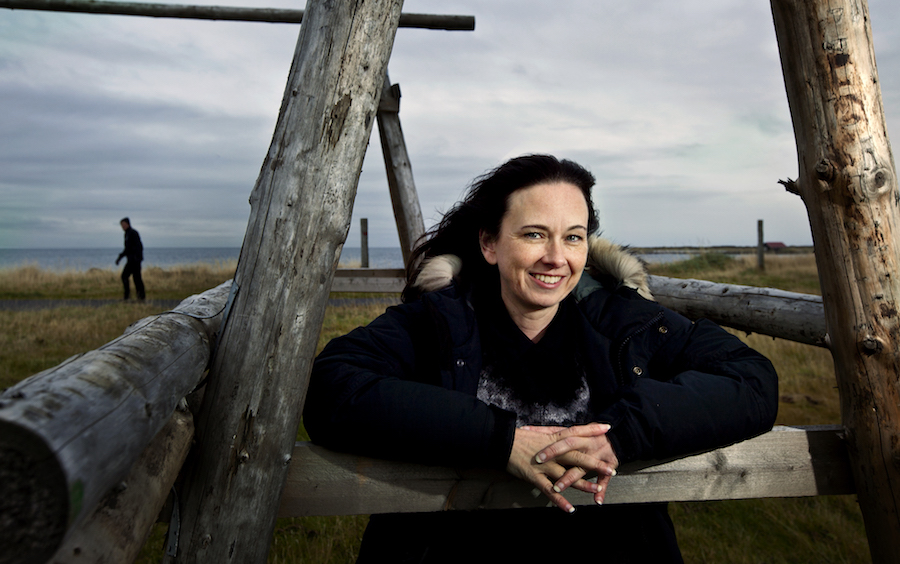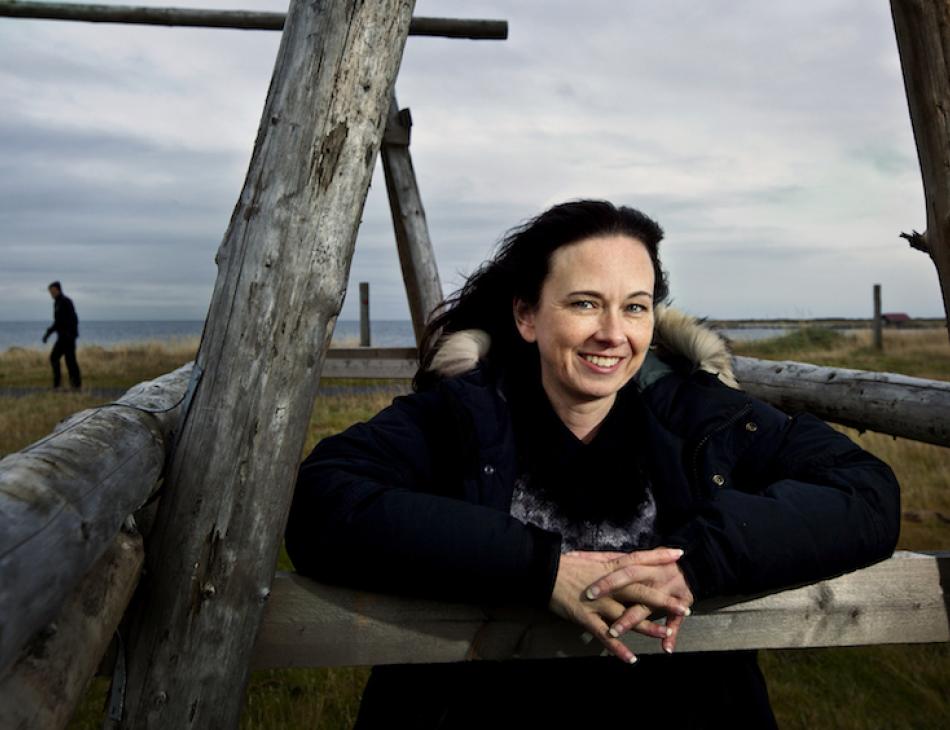Queen Of Icelandic Crime 'Noir' Yrsa Comes To London
It’s perhaps ironic that with Iceland having one of the lowest murder rates in the world, the local population is lapping up crime fiction by Icelandic and foreign novelists in the murder mystery genre. You just have to compare homicides in Reykjavik to Caracas. In fact the murder rate in Iceland is twenty times lower than the world average according to the ‘Homicide Map’ from Brazilian think tank Igarapé.
“Normally writers in Iceland producing crime fiction have had their focus on characters who are middle-aged male individuals with a slightly alcoholic inclination,” says Yrsa Sigurðardóttir, one of Europe’s best selling crime novelists and dubbed Iceland's answer to Stieg Larsson. To date her works have been translated into over thirty languages.
Speaking at the start of a UK book tour late in May to promote her latest work ‘The Undesired’ in the leafy north London suburb of Barnet at Osidge Library, the author gave a well-attended audience an insight into her literary work and life experiences.
Some might think that literary festivals are more usual turf for Sigurðardóttir and speaking alongside leading crime writers like Val McDermid at the ‘Bloody Scotland’ festival (www.bloodyscotland.com) or at the Hay Festival next to Anthony Horowitz (www.bbc.co.uk/programmes/p0204m10).
Interviewed by fellow crime writer Quentin Bates, a British journalist and translator who has written five crime fiction stories to date set in present-day Iceland, Sigurðardóttir gave an engaging and at times witty account of her career to date.
The discussion came prior to book talks and signings at Waterstones bookstore in London’s Piccadilly and the Marriott Hotel in Bristol.
Sigurðardóttir, who is a civil engineer by profession and qualified from Iceland's University in Reykjavík, jokingly remarked that it would be “super easy” to take an engineer as a main character in any of her books.
Thus far she has written seven novels in the crime and horror genres since starting back in 1999, plus a few books for children besides (she won the 2002 Icelandic Children’s Book Prize with Biobörn). Her crime novels include ‘Ashes to Dust’, ‘Last Rituals’, ‘The Day Is Dark’ and ‘The Silence of the Sea’.
Her horror thriller, ‘I Remember You’, is partly based on a true story and set in an isolated village in the Icelandic Westfjords. Three friends here embark on refurbishing a derelict house - only to find they are not alone and it starts to make its presence felt.
Speaking to Bates, an Englishman originally from Hampshire who in his youth travelled in his youth to Iceland and lived there for many years, Sigurðardóttir gave a frank and humorous account of her writing and offered insights into the Icelandic psyche as well as detailing some recent grisly and gruesome real-life murders in Iceland.
It should be pointed out that it took a long time for publishers in Iceland to see that there was “great potential” for the nation’s public to absorb or rather accept crime thrillers and murder mysteries given the low murder rate. The transition has nevertheless happened over the past twenty or so years. Essentially it hinged on readers being able to imagine horrible happenings. And, so it turned out.
Bates, who is also one of the few Icelandic-English translators around today, was commended by Sigurðardóttir during the discussion on his work. His crime novels have been translated into into German, Dutch, Finnish and Polish.
In an eclectic and diverse career he has also worked as a truck driver, teacher and fisherman in England. Looking back on his experiences and time living in the north of the country in a tiny hamlet with one shop and a post office, he remarked that Iceland was “almost like two countries…Reykjavík and the rest of the country.”
Gunnhildur Gísladóttir and his book that became ‘Frozen Out’ (titled ‘Frozen Assets’ in the US) grew out of a university writing course that enabled Bates to take an afternoon off work once a week. Other books in his series are ‘Cold Comfort’, ‘Cold Steal’, ‘Chilled To The Bone’ and ‘Thin Ice’ (see: http://graskeggur.com/).
Sigurðardóttir’s central character in her crime novels to date - lawyer Thóra Gudmundsdóttir - has now been put to bed so to speak, the diminutive Icelander revealed. Whether the character might return remains to be seen. Having also written books in the horror genre, the talented novelist noted that there was “very little good horror writing out there.”
To date, her portfolio of literary output has been successfully translated into 35 languages. Germany proves to be a robust market for her work. And, just a week prior to the event in in early May she was in Prague. She remarked that the Czechs gave her a warm welcome.
The Undesired
Sigurðardóttir’s most recent crime novel, ‘The Undesired’, is a truly haunting book that will prevent you from sleeping at night as you discover disorientating conditions such as anencephaly where a baby is born without the top of the skull.
“From the start of the book, you will not want to put it down as you begin with the end and want to find out more,” my daughter Charlotte told me after I gave her a signed copy of the book, which she polished off in a few days.
“Sigurðardóttir plays well with opposites to build up the plot,” the student at Royal Holloway UCL remarked. “For instance, she manipulates the idea of children who are traditionally considered as being innocent and inoffensive - seldom given major roles in crime novels as a result.” But it is not until the very end of the book that we discover the truth of what actually took place and the broken and dark personality that set things off.
The Movie
Next year a movie based on one her latest books is scheduled to be released. Commenting on this development, Sigurðardóttir revealed that she was asked by producer and director to attend the set to provide
advice where necessary.
She took a conscious decision as it transpired to “step back” from actually doing this. One might ask why? “Because of this the film production team probably had to engage more and do more work to get to grips with things. The outcome was that the script ultimately ended up in far better shape.”
In terms of plot and characters, Sigurðardóttir told the audience that she “normally knows the beginning and the end” when starting out on her novels. That said, she acknowledged as a writer that: “One needs strong characters and a strong plot. One without the other is unlikely to turn out that well or be good.”
Given her civil engineering background, she applies a forensic approach to her work. “It comes in handy as regards the plotting and researching aspects.” The author also disclosed that she uses various locations for the inspiration in her crime writing. “You tend not to see things if it’s too close to you,” she remarked.
Highlighting that Sigurðardóttir “doesn’t like making it up”, one of her books, ‘The Day Is Dark’, is set in Greenland and the kernel of the idea evolved from her working on a construction project in the highlands of Iceland.
On Greenland she said: “Depending on whether you go to the east or west coast…you could say the east of the country is weird. The west, where the population is concentrated, and south coast at least have some soil.”
With all towns and settlements of Greenland situated along the ice-free coast, she added: “The east coast is not designed for human habitation.” It’s certainly an extremely tough environment. Indeed, and let’s not forget that shipping harbours on the east coast of Greenland are often closed for around eleven out of twelve months of each year.
Reflecting on being dubbed the ‘Queen’ of Icelandic crime noir, she said: “I’m the Queen but I would point that I received that honour and title when I was virtually the only woman in the country writing crime novels.”
Future Plans
Sigurðardóttir reveals that she is now working on a new series of novels under the title of ‘The Children’s House Series’, the first of which is due to be published in 2017. This is up for the Glass Key award for the best Nordic crime novel.
The Glass Key is an award given by members of the Crime Writers of Scandinavia (Skandinaviska Kriminalsällskapet) - comprising associations in Denmark, Norway, Sweden, Finland and Iceland - who vote every year on a shortlist to come up with a winner.
The only Icelandic winner has been Arnaldur Indriðason, who managed to win two years in a row in 2002 and 2003. Swedish writer Henning Mankell was the first winner of the award - a real glass key - back in 1992 with Faceless Killers (Mördare utan ansikte).
In other future endeavours, the Icelander, who has also lived in Canada for a period of time says that aside from crime books she might contemplate “writing something apocalyptic”. Might this, as Bates chipped in, be along the lines of a “zombie apocalypse in Iceland” taking in themes perhaps a volcanic eruption or civil war? Quite Possibly, but we’ll have to wait on that score.
However, the author did provide us with a hint. “Basically something where everything you count on being there is not there," she remarked darkly.
Responding in the Q&A session at the end of the talk on whether her writing had changed over time and through experience of the world, she disclosed: “Yes, you become more morbid. After all there are disgusting things that happen in the world.” ‘The Undesired’ was translated from the Icelandic by Victoria Cribb, one of Icelandic literature’s best-known translators into English, working with Arnaldur Indriðason, Sjón, and Gyrðir Elíasson amongst others.
About the author: Roger Aitken is a journalist who contributes to Forbes amongst other titles and was a former FT staff writer.










